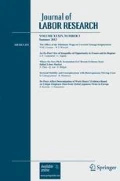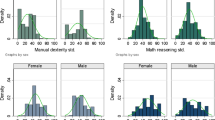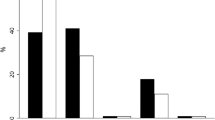Abstract
We investigate the effect of English language proficiency on the wages of native full-time employees in Poland. Using a unique data set with information on over 600,000 survey respondents polled over the five-year period from 2013 to 2017, we employ an IV approach founded on a natural experiment - namely, the reform of foreign language instruction in Polish schools. Our preferred estimates indicate that monthly wages for those individuals with ‘good’ or ‘very good’ knowledge of English exceeded the wages of those with ‘no English’ (or those with just a conversational proficiency) by nearly 60% for men and more than 50% for women. The estimates are statistically significant for both genders, and suggest quantitatively relevant wage returns for proficiency in English.


Similar content being viewed by others
Notes
For an extensive bibliography of literature in language economics, the reader is referred to Gazzola et al. (2016).
There is also some evidence that self-evaluations may be a generally reliable way of measuring the level of language skills. Oscarson (1984), Blanche and Merino (1989) and Ross (1998) all conclude that self-assessments are highly correlated with the outcomes from formal tests of language ability. In a more recent study, Dragemark Oscarson (2009) reports the results from the Swedish National Evaluation where correlations between self-assessed and formal scores were high (about 0.7) and where 85% of students received the score they had estimated.
References
Akresh I, Frank R (2011) At the intersection of self and other: English language ability and immigrant labor market outcomes. Soc Sci Res 40:1362–1370
Angrist J, Pischke J (2009) Mostly harmless econometrics. Princeton University Press, Princeton
Araújo L, Dinis da Costa P, Flisi S, Soto Calvo E (2015) Languages and employability. European Commission Joint Research Centre science and policy report
Blanche P, Merino B (1989) Self-assessment of foreign language skills: implications for teachers and researchers. Lang Learn 39:313–340
Bleakley H, Chin A (2004) Language skills and earnings: evidence from childhood immigrants. Rev Econ Stat 86:481–496
Bormann S, Ridala S, Toomet O (2019) Language skills in an ethnically segmented labour market: Estonia 1989-2012. Int J Manpow 40:304–327
Card D (1999) The causal effect of education on earnings. In: Ashenfelter O, Card D (eds) Handbook of labor economics, vol 3. Elsevier, Amsterdam, pp 1801–1863
Card D (2001) Estimating the return to schooling: progress on some persistent problems. Econometrica 69:1137–1160
Card D, Lee D (2008) Regression discontinuity inference with specification error. J Econ 142:655–674
Clarke D (2017) PLAUSEXOG: version-15 Stata module to implement Conley et al.'s plausibly exogenous bounds. Persistent link: https://EconPapers.repec.org/RePEc:boc:bocode:s457832
Clarke D, Matta B (2017) Practical considerations for questionable IVs. MPRA Paper No. 79991, University Library of Munich, Germany
Conley T, Hansen C, Rossi P (2012) Plausibly exogenous. Rev Econ Stat 94:260–272
Di Paolo A, Tansel A (2015) Returns to foreign language skills in a developing country: the case of Turkey. J Dev Stud 51:407–421
Di Paolo A, Tansel A (2019) English skills, labour market status and earnings of Turkish women. Economic Research Center (ERC) Working Paper in Economics No. 19/01 (February, 2019). Forthcoming in Empirica, vol. 46
DiNardo J, Pischke J (1997) The returns to computer use revisited: have pencils changed the wage structure too? Q J Econ 112:291–303
Dragemark Oscarson A (2009) Self-assessment of writing in learning English as a foreign language. University of Gothenburg studies in educational sciences No. 277
Dustmann C, van Soest A (2001) Language fluency and earnings: estimation with misclassified language indicators. Rev Econ Stat 83:663–674
Dustmann C, van Soest A (2002) Language and the earnings of immigrants. Ind Labor Relat Rev 55:473–492
EC [European Commission] (2012) Europeans and Their Languages – Special Eurobarometer 386
EC [European Commission] / EACEA / Eurydice (2017) Key data on teaching Languages as School in Europe – 2017 Edition. Eurydice Report. Luxembourg Publications Office of the European Union
Gazzola M, Grin F, Wickström B (2016) A concise bibliography of language economics. In: Gazzola M, Wickström B (eds) The economics of language policy. MIT Press, Cambridge
Ginsburgh V, Prieto Rodriguez J (2011) Returns to foreign languages of native workers in the EU. Ind Labor Relat Rev 64:599–618
Grin F (2001) English as economic value: facts and fallacies. World Englishes 20:65–78
Grin F (2003) Language planning and economics. Curr Issues Lang Plann 4:1–66
Gunderson M, Oreopoulos P (2010) Returns to education in developed countries. In: Brewer D, McEwan P (eds) Economics of education. Elsevier, New York, pp 37–43
Hamilton D, Goldsmith A, Darity W (2008) Measuring the wage costs of limited English: issues with using interviewer versus self-reports in determining Latino wages. Hisp J Behav Sci 30:257–279
Hausman JA (1978) Specification tests in econometrics. Econometrica 46:1251–1271
Imbens G, Wooldridge J (2007) Instrumental variables with treatment effect heterogeneity: Local Average Treatment Effects. What’s New in Econometrics, NBER Summer Institute Method Lectures, No. 5
Janowski A (1992) Polish education: changes and prospects. Oxf Stud Comp Educ 2:41–55
Kachru B (1986) The alchemy of English: the spread, functions, and models of non-native Englishes. Pergamon, Oxford
Komorowska H (2014) Analyzing linguistic landscapes: a diachronic study of multilingualism in Poland. In: Otwinowska A, De Angelis G (eds) Teaching and learning in multilingual contexts: sociolinguistic and educational perspectives. Multilingual Matters, Buffalo, pp 19–31
Lang K, Siniver E (2009) The return to English in a non-English speaking country: Russian immigrants and native Israelis in Israel. The B.E. J Econ Anal Policy 9:Article 50
Liwiński J (2018) The wage premium from foreign language skills. GLO Discussion Paper No. 251. Global Labor Organization, Maastricht
Modiano M (2017) English in a post-Brexit European Union. World Englishes 36:313–327
Montiel Olea J, Pflueger C (2015) A robust test for weak instruments. J Bus Econ Stat 31:358–369
Oreopoulos P (2006) Estimating average and local average treatment effects of education when compulsory schooling laws really matter. Am Econ Rev 96:152–175
Oscarson [Oscarsson], M (1984) Self-assessment of foreign language skills: a survey of research and development work. Council of Europe, Council for Cultural Co-operation, Strasbourg
Pesaran M, Taylor L (1999) Diagnostics for IV regressions. Oxf Bull Econ Stat 61:255–281
Ross S (1998) Self-assessment in second language testing: a meta-analysis and analysis of experiential factors. Lang Test 15:1–20
Seidlhofer B (2010) Lingua franca English: the European context. In: Kirkpatrick A (ed) The Routledge handbook of world Englishes. Routledge, London, pp 355–371
Seidlhofer B (2011) Understanding English as a lingua Franca. Oxford University Press, Oxford
Toomet O (2011) Learn English, not the local language! Ethnic Russians in the Baltic States. Am Econ Rev Pap Proc 101:526–531
van Kippersluis H, Rietveld C (2018) Beyond plausibly exogenous. Econ J 21:316–331
Wang H, Smyth R, Cheng Z (2017) The economic returns to proficiency in English in China. China Econ Rev 43:91–104
Acknowledgements
We thank two anonymous referees and the editor for their very helpful contributions to two major revisions of this paper. The authors are listed in alphabetical order and all contributed equally to the research reported here.
Author information
Authors and Affiliations
Corresponding author
Additional information
Publisher’s Note
Springer Nature remains neutral with regard to jurisdictional claims in published maps and institutional affiliations.
Rights and permissions
About this article
Cite this article
Adamchik, V.A., Hyclak, T.J., Sedlak, P. et al. Wage Returns to English Proficiency in Poland. J Labor Res 40, 276–295 (2019). https://doi.org/10.1007/s12122-019-09291-2
Published:
Issue Date:
DOI: https://doi.org/10.1007/s12122-019-09291-2




